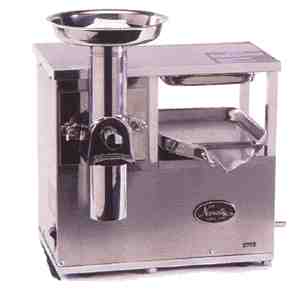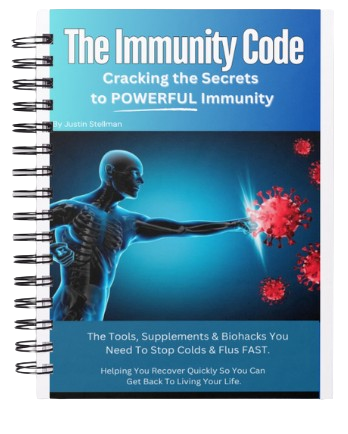| Click play below to hear our lively interview with Chris Wark on how his juicing overcame colon cancer! |
| Listen to other shows about this topic. |
 A lot of people have been asking me lately about which type of juicer I recommend. It’s really tough to say because it depends on lots of factors. If you’re buying a juicer you’ll want to ask yourself some questions. I have to ask you, why do you want a juicer? Do you want one because you saw an infomercial on late night T.V. and got hooked? That actually happens with a lot of people.
A lot of people have been asking me lately about which type of juicer I recommend. It’s really tough to say because it depends on lots of factors. If you’re buying a juicer you’ll want to ask yourself some questions. I have to ask you, why do you want a juicer? Do you want one because you saw an infomercial on late night T.V. and got hooked? That actually happens with a lot of people.
If that’s you I would strongly suggest you do your research first before you buy a juicer. Read reviews and find out what people like and what they don’t like about it. Amazon.com is a great resource for this. I’m not going to suggest an actual brand but in this post I’ll be focusing more on the “type” of juicer for your particular needs.
Personally I started out with the Juiceman juicer and then upgraded to the Breville juicer. My wife and I really like it.
We used to juice about 6 days a week. We’re down to about 3 days a week. But we’re consistent with it and that’s what really matters in the long run. No use juicing 7 days a week for 6 months and then never using it again. You don’t want your juicer collecting dust for 10 years in the garage and then end up selling it for $20 bucks at a garage sale.
Only buy a juicer if you know you’re going to use it and you’re interested in using it for the long haul. I know that nobody thinks they’ll stop juicing when they actually buy one, but it happens to a majority of people.
Personally I think people should start off buying a cheap centrifugal juicer first and see how they fair with it. I had my Juiceman for over a year and I juiced on average about 5 to 6 days a week. The chute was so small I had to cut everything up into tiny pieces in order for it to fit into the juicer but I loved doing it. I knew how good it was for my body. I listened to all the Juiceman’s tape series about juicing, WHILE I was juicing.
Now that’s motivation.
This helped me to develop the habit or the daily discipline of juicing. It also helped me to really appreciate the upgraded industrial model I ended up buying. For these two reasons I think it’s best to start cheap and develop the habit. If you end up giving up on juicing, you’ll be glad you didn’t waste your money on a $500 dollar juicer. And if you stick with it, you’ll be glad you now have a new healthy habit in your life and you’ll REALLY appreciate a good high powered juicer.
Ease Of Use

If the most important factor is how long it takes to clean and make a juice, then you should really look at a centrifugal style juicer. This is where the blade spins at a high rate of speed and the fruits or vegetables actually get shaven down and pulverized and then the juice passes through a fine metal mesh screen that seperates the fiber from the juice.
If you buy this style of juicer I’d recommend buying one where the pulp actually shoots out the back into a free standing basket. You don’t want the pulp in the are that spins as it can become like a washing machine where all the pulp sticks to one side and you have to keep turning it off and on to make sure it stays balanced.
Also I’d recommend you get one with a wide chute so you don’t have to do much cutting of the fruits or vegetables. I can fit whole apples in mine.
Pros:
- They’re cheap
- Easier to clean (less washable parts)
- Less cutting
- Fast
Cons:
- Oxidation (heat and friction can destroy many enzymes)
- Won’t last as long after it’s made (Drink fast Johnny!)
- The heat actually can cause the juice to be warm when it’s done. (Add ice cubes)
- Pulp can be less dry than other styles of juicers (less economical in the long run)
- They make more noise
Price

If price is your only concern, I would wait, research and save so it’s not your only concern. But if you want something cheap and easy, you’ll definitely want to go with something at Costco like the Jack LaLanne Power Juicer. For a hundred bucks you can’t go wrong and it will definitely teach you as to how they work and their ease of use.
Plus Costco will take anything back. Just don’t take back the desk you bought from Target like my friend did. They’ll probably take it!
Even better go onto Ebay and make some small bids or even Overstock. But the best prices will be found on Craigslist or at a local garage sale.
Quality

This is where we all want to be. We want to have the funds to buy the best quality juicer and the time to make it every day. I’m still working my way to this point.
If you’re battling cancer or other diseases and don’t care about price or the ease of use, then you should get a good press juicer. If you’re dealing with a chronic condition and have the time each day (and motivation) you’ll want to buy a juicer based on the quality of the juice it produces.
In my opinion, if you’re only concerned with price and ease of use, then you’re probably not buying a juicer for the right reason. If it’s health you’re after, then the quality of the juice should be the number one priority. If it takes an extra 10 minutes of cleaning, it’s worth it because you’re worth it, right?
I’d like to buy one of these types of juicers one day and then combine it with the FoodSaver technology to store it for the week. People have even added products like Crystal Energy or Mega Hydrate and raw unheated honey (because of the high enzyme count) to the juice to ensure the stability of it. I like the idea of making juice one day per week and putting them into glass containers with a chemical free air tight lid
with some honey or Mega Hydrate in it and that will last a week easily.
If you’re looking quality, the highest quality juice is juice you crush or press with a hydraulic press machine. The one that comes to mind is the Norwalk Juicer. Essentially you put the fruits or veggies into the chute and it grinds it up at a low rate of speed and then spits it into a special strainable bag. You then fold that bag up and place it under the press.
This allows the juice to not be exposed to oxygen and heat allowing the juice to last way longer then normal juicers. This is why the Blueprint Cleanse uses the Norwalk Juicer.
The second best type of juicer for quality in my opnion are the slow grinding juicers like the Hurom or the Omega
. These juicers are excellent. You will have to cut up your veggies and spend more time preparing the juice. It’s not as high a quality as the hydraulic press machines.
The third best quality juicers in my opinion are the triturating or masticating juicers. They are also referred to as twin gear or sometimes they might have 1 single auger. It also squeezes the material and crushes it in between two gears. It does produce higher quality juice than a spinning blade centrifugal juicer, but you’ll have to spend more time cleaning it. It can be a pain to get it to work with certain veggies (depending on whether or not they are hard or soft) so this is also something to consider.
I personally don’t recommend one of these because for the same time and effort you could get a better quality juice from a Hurom or Omega. One of the more popular twin gear juicers is the Green Star Elite.
Pros:
- Much higher quality and healthier juice
- Juices will last longer
- You can make juice less frequently because of the shelf life
- More economical as the pulp is drier
Cons:
- Takes longer to make & clean up
- They’re more expensive
- Take up more counter space
I hope this article was helpful to you. I hope that you were able to determine which type of juicer to buy. Please leave some comments below or on our Facebook page.
Questions Of The Day
What type of juicer do you currently own? Do you like it? How often do you use it?



Some great reviews here! Those realy help people to chose their juicer model to buy.
Regards,
Tammy Howard of http://wheatgrassjuicer.co
Hi Tammy,
Thanks for this. I really wanted to focus more on which style vs what brand is best. Thanks for writing in! 🙂
@wheatgrass juicer Thanks Tammy, even though you put your name as “wheatgrass juicer”. I appreciate your comment, if you’re a real person. 🙂